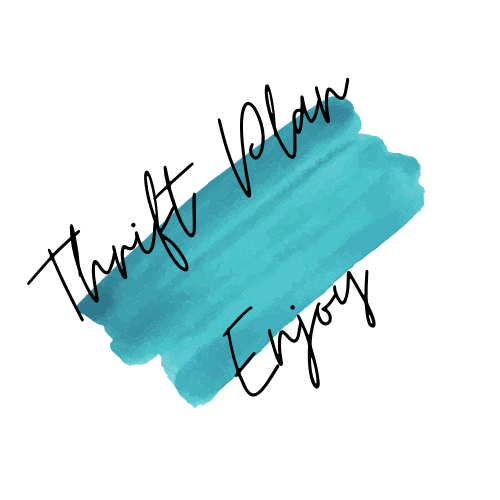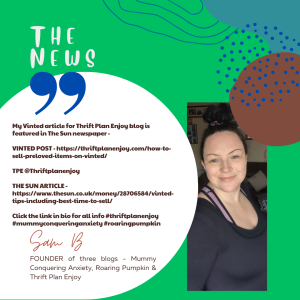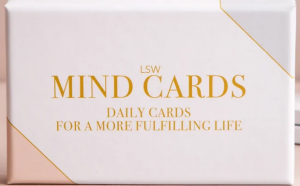Welcome to my Employment Vibes content!
Having gone through significant job changes over the last five years, including redundancy, and switching careers, I feel ready to pursue my career goals. I wanted to share with you the employment journey I have been on and help those also looking for a job.
Let’s dive into the series, starting with How to Prepare for a Competency-Based Interview Properly.
Over the last two months, I’ve applied for any job which is relevant to me, in the hope of finding a position with more hours and a role which is more challenging.
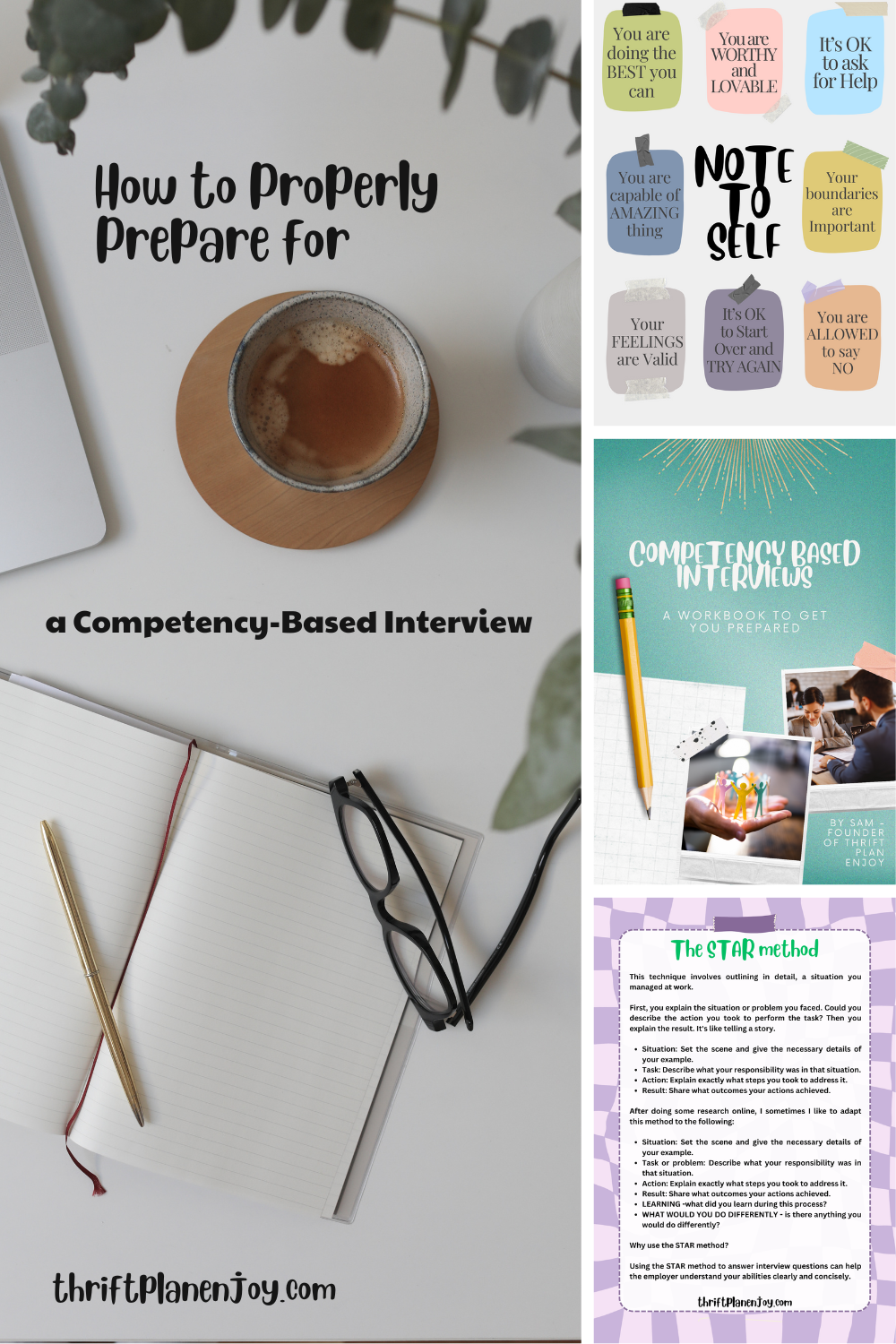
I was actually successful in getting the role that I interviewed for first. But I also decided to keep my options open whilst going through the process. Interviewing at several different companies was a great experience for me. And when I first started this process, I genuinely didn’t know which role I would take. Going through this process over a few months, helped me narrow down my ambitions and preferences.
Sam – Founder – Thrift Plan Enjoy Blog
Here are my tips for starting the process and getting ready for the competency-based interview:
read and understand the job advert
The job advert is where the employer or recruitment agency will outline what they are looking for. You will occasionally see important information about deal-breaker scenarios. For example, they must be available for training for the whole of August. I appreciated this information when job-hunting – because it meant I could easily discount these jobs, based on the deal breaker terms, which I simply wouldn’t be able to meet. Bearing in mind childcare and my own deal-breakers. Such as always been around to drop my little one off at school.
Don’t be put off if you don’t meet ALL of the criteria in the job advert. But do look out for details on what your job would entail and whether you think the role would be suitable for you. What I mean by this, is if you hate being stuck in an office and like the outdoors, don’t apply for a position where you will be office-based every day and constantly speaking to people via phone and meeting in person. There are compromises you can make, such as hybrid working or supporting a team with less contact involved.
pick out the main competencies from the job description or person specification
When trawling through the job advert, you are essentially looking to match your experience to what is stated. But please don’t be put off if you don’t meet ALL of the job description and personal specification criteria. In my experience, employers are often looking for personality, in addition to candidates being able to do the job. They may also be willing to offer training in the areas you need it. You know know until you apply. So I would always say go for it, if you match most of the job description or person specification.
I picked out the main competencies from the job description or person specification by highlighting the criteria I met and picking out the wording, which I could then mirror in my cover letter and CV.
put a lot of preparation into breaking down the competencies and relating them to your career experience
HELPFUL TIP – a lot of employers use AI to analyse cover letters and CV’s, meaning they are looking for keywords used in the job description or person specification. Mirroring the exact wording used and tailoring it to your own experience can help you pass this stage of the checking process.
An example of some generic wording I picked up in several job applications was:
- Experience in providing efficient administrative support to a busy team
- Excellent organisational skills with a clear logical approach to work including an understanding of the principles of good project management
- Experience in extracting and interpreting data for monitoring reports
Out of the above, I would pick out these keywords or phrases:
providing efficient administrative support
Excellent organisational skills
extracting and interpreting data for monitoring reports
understanding of the principles of good project management
I would then put this wording into real-life examples from my own experience:
providing efficient administrative support
I am seeking a fresh opportunity that will allow me to leverage my organisational abilities and excel in a new role. I take great pride in delivering exceptional administrative services. With 12 years of experience in administration.
I thrive on providing efficient administrative support to a busy team, bringing the local community together by selecting candidates to attend our peer support groups, and regularly researching volunteering opportunities for our clients.
Experience in extracting and interpreting data for monitoring reports
Since working for XXX I have completed quality checks and data cleansing tasks to ensure we have accurate reports when we need to provide our monthly and quarterly monitoring reports. Part of my role involves extracting and interpreting data.
I recently created a dashboard to showcase the statistics for each Support Worker, which would feed into caseload management between our Team Leader and individual Support Workers.
Excellent organisational skills
When I started my recent role, there were no standard templates created. I, therefore, used my excellent organisation skills to set up a meeting minutes template and created a filing system for meeting minutes. When asked to provide data to our leadership team, I referred back to these records and used this information to drive changes to policy.
think of detailed examples or stories you can tell – of when and how you’ve demonstrated these competencies
When you haven’t applied for a job in a while, it’s difficult to get back into the mindset of answering questions in a competency-based way. But practising this right from the job-hunting stage can get you into the mindset of answering the interview questions. And it will eventually become second nature, making your responses sound more natural.
Using the STAR method, start writing examples of how you meet the competencies listed in the job description, as this will be useful for any future interviews you attend.
start from the beginning and save your answers
EVERYTHING you do, right from the stage of reading job adverts is useful. Create spreadsheets and save that information. I ended up with several tabs on a spreadsheet – applied for jobs, a summary of jobs I decided not to apply for and the reasons. Job adverts that ended, companies to look out for in future.
Note down everything!
Want more detailed examples and information to help with your competency-based interview?
You can now download my competency-based interview workbook.
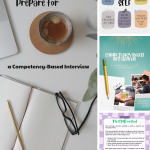
practice your answers with the STAR response technique
What is the STAR method?
This technique involves outlining in detail, a situation you managed at work.
First, you explain the situation or problem you faced. Describe the action you took to perform the task. Then you explain the result. It’s a bit like telling a story.
- Situation: Set the scene and give the necessary details of your example.
- Task: Describe what your responsibility was in that situation.
- Action: Explain exactly what steps you took to address it.
- Result: Share what outcomes your actions achieved.
After doing some research online, I sometimes like to adapt this method to the following:
- Situation: Set the scene and give the necessary details of your example.
- Task or problem: Describe what your responsibility was in that situation.
- Action: Explain exactly what steps you took to address it.
- Result: Share what outcomes your actions achieved.
- LEARNING -what did you learn during this process?
- WHAT WOULD YOU DO DIFFERENTLY – is there anything you would do differently?
Why use the STAR method?
Using the STAR method to answer interview questions can help the employer understand your abilities clearly and concisely.
Other pages to check out on the blog
This isn’t my only blog, I have three. You can check out all the details here.
All the information you need if you want to guest post on my website. I welcome all ideas and can’t wait to chat with you.
Sign up for my freebie library here.
A page dedicated to Things To Do With The Kids – looking for inspiration for your day out? Or appropriate overnight plans? look no further.
Check out my page on money-saving hacks.
I am looking for sponsored and gifted collaborations, for future blog posts. You can find more details by visiting this page.
My page is dedicated to Gift Guides – bringing you wonderful items, I would purchase myself or items I find useful. Check it out.
Examples of competency-based questions you might be asked
- Describe a time that you had to work to a tight deadline, while still managing your normal workload.
- Give an example of a complex project or task and how you made sure to see the task through to the end.
- Please give an example of when you have taken pride in something you have achieved, or taken pride in a job and the organisation you have worked for. Please explain why this was important to you.
- Tell me about a project that did not go according to plan. What corrections did you make and what were the results?
- Can you describe an instance where you developed a strategy to stay organised and ensure you get all your work done under pressure?
- Describe a time you had multiple projects on – how did you manage your time effectively and prioritise your tasks?
- Please give an example of when you’ve treated others with respect and consideration; where you’ve listened carefully and responded with empathy, kindness and sensitivity.
- can you give me an example of how you’ve used verbal communication to change someone’s mind?
Want more examples of competency-based interview questions, so you can fully prepare for your interview? Check out my comprehensive workbook here.
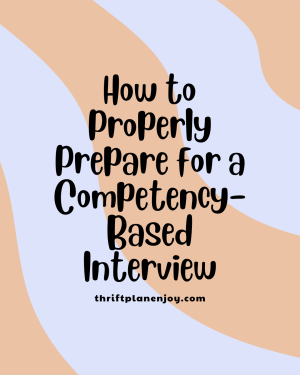
How to recognise a competency-based interview question
Questions will usually be asked in the following format – therefore if you haven’t been sent the questions in advance, there will be a signal during your interview that it’s time to answer using the STAR method.
- Tell me about a time when…
- What do you do when…
- Have you ever…
- Give me an example of…
- Describe a situation…
anticipate which questions will be asked before your interview
Some employers now issue competency-based questions before the interview. I think this is a great idea. If employers are looking to understand potential candidates, seek out unique talent and employ people who contribute in the best way possible, providing the interview candidate with time to prepare is a great idea.
In a recent interview, I was some of the questions were sent in advance. In other interviews, I could gauge what types of questions might be asked by looking at the role profile and researching the company and the department I would be working in.
rehearse your answers
For every interview I’ve had during my career, I always prepare notes and I usually print these out. With the introduction of remote interviews conducted via Microsoft Teams or Zoom, it’s easier to refer to notes quickly. I use them as a prompt, when I am asked a certain question, I can refer to bullet points about my answer.
Because I am used to creating video content, I also filmed myself giving some of my interview answers. For me, as an anxiety sufferer, it takes away the nervousness of when the questions are asked for real, in an interview setting.
be yourself
Out of the five interviews I attended recently, personality was either a deciding factor on whether to employ me or the interviewers’ personality and the company’s culture was a deciding factor on whether I declined the position or continued with the recruitment process.
We are all people at the end of the day, and personality and how you would fit into a company carries a lot of weight. Depending on the role you are applying for, you should also treat any interview as if you are interviewing the company. Ask questions and ensure that working for the company would be the correct fit for you.
I was actually successful in getting the role that I interviewed for first. But I also decided to keep my options open whilst going through the process. Interviewing at several different companies was a great experience for me. And when I first started this process, I genuinely didn’t know which role I would take. Going through this process over a few months, helped me narrow down my ambitions and preferences.
Want some examples of how to answer competency-based questions?
Can you describe a time when you proposed a solution to a work-related problem?
OR
Tell me about a time you’ve had to persuade someone.
Situation – When I worked at XXX the administration side of my role took up a lot of time, in addition to collating case files for the XXX and answering queries on the ongoing complaints we had with them.
Task – To solve this problem, I met with the administration team and my managers to work out a plan for some help to collate paper case files for the XXX.
Action – Having put forward our viewpoints in a constructive way.
Result – we were able to reach an agreement for them to help with the admin. It was great that I was able to ask for help when I needed it.
LEARNING – it’s always worth seeking help and support, and asking in the right way.
WHAT WOULD YOU DO DIFFERENTLY – Next time,
I would actively ask for a meeting to discuss our viewpoints.
Tell me about a time when you experienced a significant change at work
Situation – I recently experienced a change at work. xxx has moved to a new building to allow the local authority to create a well-being hub for the area on our old site.
Task or problem – The change disrupted working patterns and impacted team meetings. As our team is mainly community-based, this is the only time we come together to talk about updates.
Action – I dealt with this disruption and change by liaising with the PA to the senior leadership team, to switch room bookings around over the next few months and actively planned hot desk bookings for my time spent in the office.
Result – I was then able to update our team and reassure them that, despite the disruption, we could still meet.
LEARNING – Change is good and can be seen as a positive. It depends on your mindset and how you frame it.
WHAT WOULD YOU DO DIFFERENTLY? – ensure that anyone in the team struggling with change is supported
Want more examples of competency-based questions and answers – download my competency-based interviews workbook here.
Some other, general questions you might be asked during your interview
Sometimes interviewers will ask the following types of questions to get to know you better.
- Tell me about yourself.
- How would you describe yourself?
- What makes you unique?
- Why do you want to work here?
- Why have you applied for this role?
- What motivates you?
- How do you handle stress?
- Why are you leaving your current job?
- What are your goals for the future?
- Are you actively interviewing for other roles currently?
Until next time
All three of my blogs were set up to help other people in their lives. Whether that be on a pregnancy or motherhood journey. Being a working mum. Suffering from anxiety or other mental health problems. Or just wanting to start a side hustle and save money. Down to what to watch next on Netflix.
I HAD to share my recent job-hunting journey with you and create a useful, affordable guide to help other people in a similar situation.
I hope it helps. Let me know in the comments below if you are on a similar journey and whether you’ve had a successful job offer. I would love to hear from you.
